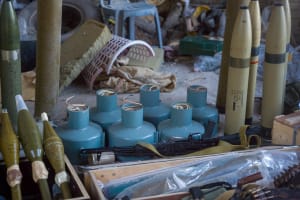Israel knew about Syrian nuclear program years before bombing Syrian reactor
Israel reportedly targets sites in Syria to knock out Iranian weaponry

Israel knew that Syria was attempting to construct a military nuclear program years before it bombed Syria’s secret nuclear reactor in 2007, according to internal documents from the Israel Defense Forces that were made public on Tuesday.
The top-secret documents date back to 2002, and contain a warning from Israel’s Military Intelligence Directorate that Syria could be attempting to begin a military nuclear program, noting secret projects “being conducted within the framework of the Syrian Atomic Energy Commission.”
“The information does not indicate an active military nuclear program underway in Syria, but it does indicate an interest in areas that can contribute to the development of a program and raises suspicions of the beginning of the development of such a program,” the documents from the early 2000s read.
After years of collecting intelligence about the Syrian reactor, in early March 2007, Mossad operatives obtained suspicious images of the site, including photos of North Korean officials.
Israel suspected that Syria was receiving help from foreign experts from North Korea, Pakistan or a third, unidentified country, and later confirmed that North Korea had been assisting Syria with its nuclear ambitions since at least 2001.
In 2007, Israel provided the United States with its findings, but the U.S. was unconvinced the reactor constituted a threat and preferred to resolve the issue diplomatically. Israel, however, feared that Syria would stall negotiations long enough to finish building the reactor.
Israel eventually decided to act alone. On Sept. 6, 2007, the State of Israel bombed the Syrian reactor, referred to locally as “the Al Kibar site,” that the Syrians and the foreign actors had almost completed in Syria’s Deir Ez-Zor province. The operation was called “Operation Orchard.”
The Al Kabir site contained a gas-cooled, graphite-moderated reactor capable of producing weapons-grade plutonium, similar to North Korea’s Yongbyon Nuclear Scientific Research Center.
In more recent news, Syria accused Israel on Tuesday night of bombing Aleppo International Airport – in northern Syria near the border with Turkey – and forcing it to close down for the second time in under a week.
Last Wednesday night, bombing campaigns, attributed to Israel, targeted the airport’s runway and radio navigation system. A similar navigation system at Damascus International Airport was targeted, as well.
On Tuesday, the state-run Syrian Arab News Agency claimed that Israel had launched missiles from above the Mediterranean Sea at the Aleppo airport and damaged the runway. Syria’s Transportation Ministry announced that all flights were to be redirected to the Damascus airport, as the Aleppo airport was “out of service” following the airstrike. While locals reported hearing loud explosions, there were no reports of injuries from the strikes.
On Thursday, Syria’s Foreign Minister Faisal Mekdad said that Israel was “playing with fire” and risking a wider military conflict.
Airstrikes earlier this year that caused significant damage to Damascus International Airport also were attributed to Israel; the strikes stopped all relevant air traffic for two weeks.
Israel’s bombing campaigns in Syria, known as the war-between-wars, are focused on destroying Iranian assets in the country and halting Iranian weapons transfers to its terrorist proxies in the region, especially Hezbollah in Lebanon.
According to The Times of Israel, Israel frequently targets Syrian airports for good reason:
“Generally, relatively large weapons are thought to be smuggled via Syria on Iranian cargo airlines, which frequently land at Damascus International and the Tiyas, or T-4, Airbase, outside of the central Syrian city of Palmyra,” the Israeli newspaper wrote. “The weaponry is then believed to be stored in warehouses in the area before being trucked to Lebanon.”

The All Israel News Staff is a team of journalists in Israel.













